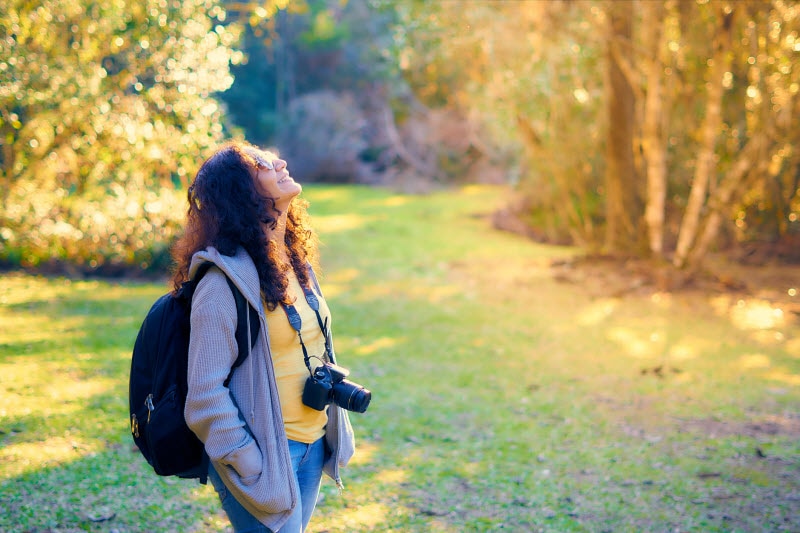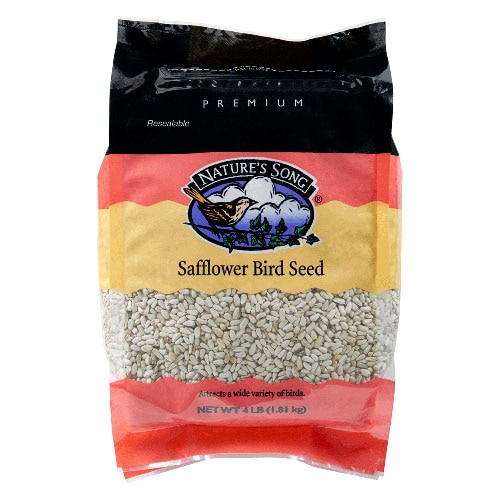[vc_row][vc_column][vc_column_text]If peering through binoculars on a chilly winter morning seems, well, for the birds, think again. Birding has much to offer humans, including greater concentration, uplifted mood, reduced anxiety and other substantial mental health perks. Birdwatching offers a trifecta of good stuff: being outdoors in nature, gentle exercise and the profound pleasure of feeling an undeniable connection to the wild and free.

“Birds are so beautiful, so mysterious and so delightful to be around,” says Lynn Leopold, an environmental educator based in Ithaca, NY.
A burgeoning number of rookie birders might agree. Especially since the pandemic, which encouraged time spent in solitude outdoors, more and more people are discovering the joys of birdwatching. It’s now one of the most popular outdoor activities in the U.S. (just shy of gardening). It can also be a valuable way to offset the discontents of modern life.
According to an article by the author of Birdpedia, Christopher W. Leahy, “in the UK, health clinics are now partnering with birding education programs at conservation organizations such as the Royal Society for the Protection of Birds (RSPB) to provide a unique and effective form of psychological support.”
The health benefits of bird watching
Nature RX
Simply being outside is good for us, offering tangible and intangible rewards to our nervous system, as it shifts the body into a more natural, relaxed state. A growing body of research suggests that exposure to nature, whether in green space (opens spaces areas, from remote wilderness to urban parks) or blue space (outdoor areas that feature bodies of water) can actually restore our capacity of attention.
One study showed that
working memory, cognitive flexibility and attentional control are improved after exposure to natural environments. Another study, cited by Leahy in his book, showed even just viewing photos of the natural world, versus photos of cityscapes, raised participants scores on tests measuring connectedness, empathy and sharing.
Mental health
In some interesting ways, birdwatching may be a great fit for people who struggle with meditating. Let’s face it—sitting for any length of time on a cushion with eyes closed can be extremely challenging for those of us with noisy minds.
“I’m a poor meditator, with too many intrusive thoughts,” says Leopold. “I find birding a way of focusing one something outside myself–and I forget what’s on my mind.”
Directing attention on birds can reduce stress and anxiety, improve mood, and promote a sense of well-being. A study published in 2020 in Ecological Economics, showed a
correlation between happiness and the number of bird species around people’s homes and towns. Being near 14 additional bird species, the study authors noted, provided as much satisfaction as earning an extra $150 per month.
Physical Activity
Although not physically demanding, birdwatching often involves walking or hiking in natural settings to spot different bird species. This can provide gentle exercise, helping to improve cardiovascular health, maintain a healthy weight, and boost overall fitness.
The power of song
Birds not only have visual appeal, but auditory as well. Bird vocalizations, particularly songs, can have a sizable impact on mood. One 2022 study found that participants’
mental wellbeing was significantly better when seeing or hearing birds compared to when not seeing or hearing birds. Another small 2013 study in the Journal of Environmental Psychology found that, of all the natural sounds one might hear,
people were most likely to associate birdsong with a reduction in stress.
Once we pay attention to bird language, we learn that there are five main types of vocalizations: songs, companion calls, territorial aggression, adolescent begging and alarms. Experienced birders not only recognize the different patterns but can recognize individual birds. “I love learning their songs,” says Leopold. “Even two birds of the same exact species can sound very different.”
Social connection
Birdwatching can be a social activity. Joining bird-watching groups or participating in community birding events can often be the common ground for new friendship to form and blossom. Most areas have local birding clubs, and park services often have organized bird walks designed for the public.
Higher education
Once the bug hits, prep yourself for a flurry of research. Identifying and cataloging birds requires attention to detail, memorization and problem-solving. As one goes deeper, a natural next step leads to a growing interest in environmental science.
Environmental stewardship
Birdwatching can foster a sense of environmental responsibility. “Birding is one of the few fields of science that values citizen scientists,” says Leopold.
“Not many disciplines rely on ordinary people.” Leopold is referring to projects such as the
Audubon Christmas Bird Count, the nation’s longest running community science bird project. Observing the beauty of birds can lead to a desire to protect their habitats and contribute to conservation efforts.
“When you start tracking birds,” says Leopold, “you not only appreciate the birds that come but also the birds that are missing.”
Ready to grab your binocs and bird? Here are a few pointers from Leopold to know before you go.
Birding tips: An etiquette primer
1. Don’t set up shop in front of someone else.
Although most birders are generous about sharing what they are looking at with interested parties, if someone has spent a long time setting up in a hide to photograph or trach a particular bird, and you camp in front of them, you will win no favors amongst your new community.
2. Leave your pet at home.
Yes, dogs love to be outside too, but nothing scares away birds faster than a boisterous dog.
3. Always bring your binoculars
Even if you are going to visit a city, there are birds everywhere. Be prepared to see some amazing birdlife, no matter how much population density.
4. Be mindful of your trash
Plastic kills most living things, but it affects seabirds in particular. Plastic pollution makes its ways to the ocean, as most of our trash does. According to the
Ocean Blue Project, “Adult birds return to nests with plastic that they have mistaken for food. The chicks ingest the plastic and are less likely to survive to adulthood. Plastic reduces the volume of the stomach, which often leads to starvation. Dead seabirds are often found with stomachs that are full of plastic waste.” The organization predicts that by 2050, 99 percent of seabird species will be ingesting plastic.
5. For the love of all birds everywhere, keep your cat indoors.
Predation by domestic cats is the number-one direct, human-caused threat to birds in the United States and Canada, according to the American Bird Conservancy. In the United States alone,
outdoor cats kill approximately 2.4 billion birds every year. If you want the birds to play, keep the cats away.[/vc_column_text][/vc_column][/vc_row][vc_row][vc_column][vc_text_separator title="Feed the Birds" border_width="2"][vc_row_inner equal_height="yes" content_placement="middle" gap="35"][vc_column_inner width="1/3"][vc_single_image image="169879" img_size="full" alignment="center" onclick="custom_link" img_link_target="_blank" css=".vc_custom_1698707634100{padding-right: 7% !important;padding-left: 7% !important;}" link="https://www.vitacost.com/natures-song-fruit-nut-berry-wild-bird-food"][/vc_column_inner][vc_column_inner width="1/3"][vc_single_image image="169878" img_size="full" alignment="center" onclick="custom_link" img_link_target="_blank" css=".vc_custom_1698707653712{padding-right: 7% !important;padding-left: 7% !important;}" link="https://www.vitacost.com/natures-song-dried-mealworms-wild-bird-food"][/vc_column_inner][vc_column_inner width="1/3"][vc_single_image image="169880" img_size="full" alignment="center" onclick="custom_link" img_link_target="_blank" css=".vc_custom_1698707670660{padding-right: 7% !important;padding-left: 7% !important;}" link="https://www.vitacost.com/natures-song-wild-bird-food-cardinal-songbird-blend"][/vc_column_inner][/vc_row_inner][/vc_column][/vc_row]
 “Birds are so beautiful, so mysterious and so delightful to be around,” says Lynn Leopold, an environmental educator based in Ithaca, NY.
A burgeoning number of rookie birders might agree. Especially since the pandemic, which encouraged time spent in solitude outdoors, more and more people are discovering the joys of birdwatching. It’s now one of the most popular outdoor activities in the U.S. (just shy of gardening). It can also be a valuable way to offset the discontents of modern life.
According to an article by the author of Birdpedia, Christopher W. Leahy, “in the UK, health clinics are now partnering with birding education programs at conservation organizations such as the Royal Society for the Protection of Birds (RSPB) to provide a unique and effective form of psychological support.”
“Birds are so beautiful, so mysterious and so delightful to be around,” says Lynn Leopold, an environmental educator based in Ithaca, NY.
A burgeoning number of rookie birders might agree. Especially since the pandemic, which encouraged time spent in solitude outdoors, more and more people are discovering the joys of birdwatching. It’s now one of the most popular outdoor activities in the U.S. (just shy of gardening). It can also be a valuable way to offset the discontents of modern life.
According to an article by the author of Birdpedia, Christopher W. Leahy, “in the UK, health clinics are now partnering with birding education programs at conservation organizations such as the Royal Society for the Protection of Birds (RSPB) to provide a unique and effective form of psychological support.”



